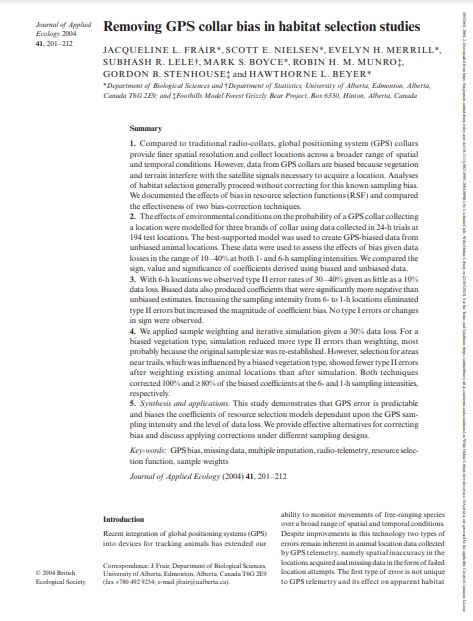Removing GPS-collar Bias in Habitat-selection Studies
Bosque Modelo:
Foothills
Temática:
Gestión forestal
Tipo de documento:
Artículo científico
Resumen
Compared to traditional radio-collars, global positioning system (GPS) collars provide finer spatial resolution and collect locations across a broader range of spatial and temporal conditions. However, data from GPS collars are biased because vegetation and terrain interfere with the satellite signals necessary to acquire a location. Analyses of habitat selection generally proceed without correcting for this known sampling bias. We documented the effects of bias in resource selection functions (RSF) and compared the effectiveness of two bias-correction techniques. 2. The effects of environmental conditions on the probability of a GPS collar collecting a location were modelled for three brands of collar using data collected in 24-h trials at 194 test locations. The best-supported model was used to create GPS-biased data from unbiased animal locations. These data were used to assess the effects of bias given data losses in the range of 10–40% at both 1- and 6-h sampling intensities. We compared the sign, value and significance of coefficients derived using biased and unbiased data. 3. With 6-h locations we observed type II error rates of 30–40% given as little as a 10% data loss. Biased data also produced coefficients that were significantly more negative than unbiased estimates. Increasing the sampling intensity from 6- to 1-h locations eliminated type II errors but increased the magnitude of coefficient bias. No type I errors or changes in sign were observed.
Información Bibliográfica
Autor:
Frair, JL, Se Nielsen, EH Merrill, S Lele, MS Boyce, RHM Munro, GB Stenhouse and HL Beyer.
Revista:
Journal of Applied Ecology
Año:
2004
N°:
-
País :
Canadá
Páginas:
201 - 212
Volumen:
41
Idioma:
Ingles
Palabras claves
GPS bias, missing data, multiple imputation, radio-telemetry, resource selection function, sample weights





